PIC16F914-I/PT Microchip Technology, PIC16F914-I/PT Datasheet - Page 197

PIC16F914-I/PT
Manufacturer Part Number
PIC16F914-I/PT
Description
IC PIC MCU FLASH 4KX14 44TQFP
Manufacturer
Microchip Technology
Series
PIC® 16Fr
Datasheets
1.PIC16F616T-ISL.pdf
(8 pages)
2.PIC16F913-ISS.pdf
(330 pages)
3.PIC16F913-ISS.pdf
(8 pages)
4.PIC16F913-ISS.pdf
(34 pages)
5.PIC16F913-ISO.pdf
(274 pages)
Specifications of PIC16F914-I/PT
Program Memory Type
FLASH
Program Memory Size
7KB (4K x 14)
Package / Case
44-TQFP, 44-VQFP
Core Processor
PIC
Core Size
8-Bit
Speed
20MHz
Connectivity
I²C, SPI, UART/USART
Peripherals
Brown-out Detect/Reset, LCD, POR, PWM, WDT
Number Of I /o
35
Eeprom Size
256 x 8
Ram Size
256 x 8
Voltage - Supply (vcc/vdd)
2 V ~ 5.5 V
Data Converters
A/D 8x10b
Oscillator Type
Internal
Operating Temperature
-40°C ~ 85°C
Processor Series
PIC16F
Core
PIC
Data Bus Width
8 bit
Data Ram Size
256 B
Interface Type
SSP/I2C/AUSART/SPI
Maximum Clock Frequency
20 MHz
Number Of Programmable I/os
35
Number Of Timers
3
Operating Supply Voltage
2 V to 5.5 V
Maximum Operating Temperature
+ 85 C
Mounting Style
SMD/SMT
3rd Party Development Tools
52715-96, 52716-328, 52717-734
Development Tools By Supplier
PG164130, DV164035, DV244005, DV164005, PG164120, ICE2000, DV164120, DM163029
Minimum Operating Temperature
- 40 C
On-chip Adc
8-ch x 10-bit
Lead Free Status / RoHS Status
Lead free / RoHS Compliant
For Use With
XLT44PT3 - SOCKET TRAN ICE 44MQFP/TQFPAC164305 - MODULE SKT FOR PM3 44TQFP444-1001 - DEMO BOARD FOR PICMICRO MCUAC164020 - MODULE SKT PROMATEII 44TQFP
Lead Free Status / Rohs Status
Lead free / RoHS Compliant
Available stocks
Company
Part Number
Manufacturer
Quantity
Price
Company:
Part Number:
PIC16F914-I/PT
Manufacturer:
Microchi
Quantity:
1 897
Company:
Part Number:
PIC16F914-I/PT
Manufacturer:
MICROCHIP
Quantity:
3 200
Company:
Part Number:
PIC16F914-I/PT
Manufacturer:
Microchip Technology
Quantity:
10 000
Part Number:
PIC16F914-I/PT
Manufacturer:
MICROCHIP/微芯
Quantity:
20 000
16.4
The PIC16F91X has multiple sources of interrupt:
• External Interrupt RB0/INT/SEG0
• TMR0 Overflow Interrupt
• PORTB Change Interrupts
• 2 Comparator Interrupts
• A/D Interrupt
• Timer1 Overflow Interrupt
• EEPROM Data Write Interrupt
• Fail-Safe Clock Monitor Interrupt
• LCD Interrupt
• PLVD Interrupt
• USART Receive and Transmit interrupts
• CCP1 and CCP2 Interrupts
• TMR2 Interrupt
The Interrupt Control (INTCON) register and Peripheral
Interrupt Request 1 (PIR1) register record individual
interrupt requests in flag bits. The INTCON register
also has individual and global interrupt enable bits.
A Global Interrupt Enable bit, GIE (INTCON<7>),
enables (if set) all unmasked interrupts, or disables (if
cleared) all interrupts. Individual interrupts can be
disabled through their corresponding enable bits in the
INTCON register and PIE1 register. GIE is cleared on
Reset.
The Return from Interrupt instruction, RETFIE, exits
the interrupt routine, as well as sets the GIE bit, which
re-enables unmasked interrupts.
The following interrupt flags are contained in the
INTCON register:
• INT Pin Interrupt
• PORTB Change Interrupt
• TMR0 Overflow Interrupt
The peripheral interrupt flags are contained in the special
registers, PIR1 and PIR2. The corresponding interrupt
enable bit are contained in the special registers, PIE1
and PIE2.
The following interrupt flags are contained in the PIR1
register:
• EEPROM Data Write Interrupt
• A/D Interrupt
• USART Receive and Transmit Interrupts
• Timer1 Overflow Interrupt
• CCP1 Interrupt
• SSP Interrupt
2004 Microchip Technology Inc.
Interrupts
Preliminary
The following interrupt flags are contained in the PIR2
register:
• Fail-Safe Clock Monitor Interrupt
• Comparator 1 and 2 Interrupts
• LCD Interrupt
• PLVD Interrupt
• CCP2 Interrupt
When an interrupt is serviced:
• The GIE is cleared to disable any further interrupt.
• The return address is pushed onto the stack.
• The PC is loaded with 0004h.
For external interrupt events, such as the INT pin or
PORTB change interrupt, the interrupt latency will be
three or four instruction cycles. The exact latency
depends upon when the interrupt event occurs (see
Figure 16-8). The latency is the same for one or
two-cycle instructions. Once in the Interrupt Service
Routine, the source(s) of the interrupt can be
determined by polling the interrupt flag bits. The
interrupt flag bit(s) must be cleared in software before
re-enabling interrupts to avoid multiple interrupt
requests.
For additional information on Timer1, A/D or data
EEPROM modules, refer to the respective peripheral
section.
Note:
Note 1: Individual interrupt flag bits are set,
2: When an instruction that clears the GIE
The ANSEL (91h) and CMCON0 (9Ch)
registers must be initialized to configure
an analog channel as a digital input. Pins
configured as analog inputs will read ‘0’.
Also, if a LCD output function is active on
an external interrupt pin, that interrupt
function will be disabled.
regardless
corresponding mask bit or the GIE bit.
bit is executed, any interrupts that were
pending for execution in the next cycle
are ignored. The interrupts, which were
ignored, are still pending to be serviced
when the GIE bit is set again.
of
PIC16F91X
the
DS41250B-page 195
status
of
their





















